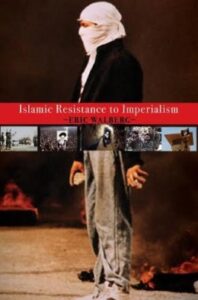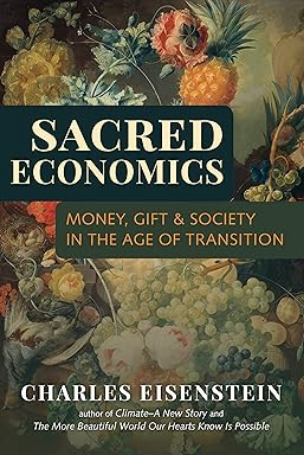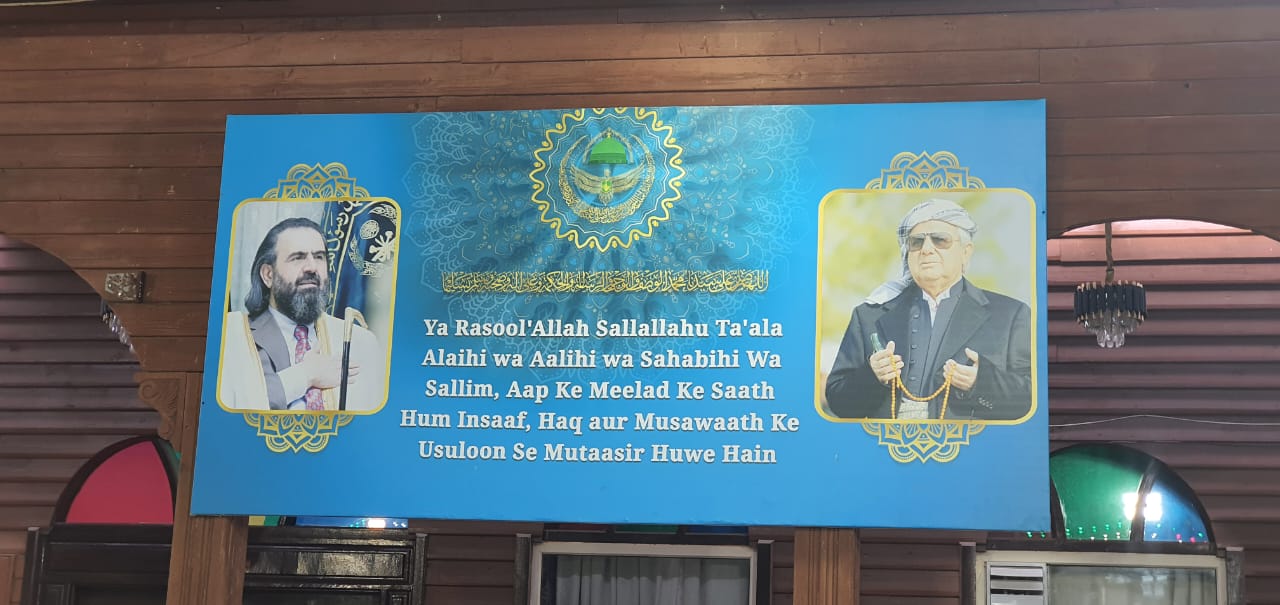Money vs the gift
Sacred Economics 100
Deconstructing the Story of Self/ the World
Life without prisons
Marx’s ‘death knell’ of capitalism, revolution, was the first answer to capitalism’s ills, after which the state would wither away, and we would live in a utopian bliss. The 20th century put paid to that vision, as revolution, as most revolutions do, disappointed, mostly unravelled, and predatory capitalism took hold again. Are we stuck with a system that’s quickly leading us to the cliff edge with seemingly no turning back?
Happily, no, and happily no need for messy revolution, though there is already growing hardship from (and growing resistance to) our economic system’s gross injustices, insanities. The transition to a new economic logic is already underway, and we can all help nurse it into reality. In Sacred Economics: Money, Gift and Society in the Age of Transition (2021), Charles Eisenstein draws on anthropology and the prophetic writings of 20th century social critics to provide the way, hidden in plain sight. To return to the gift economy, to get rid of usury, debt money. For 90% of human history, that was how we lived, not in a mindset of artificial scarcity, where even the wealthiest pinch pennies, but one of abundance, where selfishness was despised, and ‘trade’ was a way of fostering peace, not ‘war by other means’.
Basically an ecological communism, where moneyS are based on real wealth and prices include all the environmental costs of your product. We have to make most of nature (land, water, air) a ‘commons’ again, as in feudal times when most land was commons, under the authority of lords but not an alienable commodity to be bought or sold.
Eisenstein picks up where Marx left off, or rather he takes out the rhetorical flourishes and puts the economy back into ecology, and in the process, establishes the underlying laws of the human-nature nexus. The Law of Return the most fundamental: Everything you consume is consumed somewhere else in nature. The uroboros. Pioneer species pave the way for keystone species, which provide microniches for other species and circle back to benefit pioneer species as they move into new territories. Actually a tautology but one that we’ve ignored until violating its logic has brought us to the brink of catastrophe.

Uroboros vs Sorcerer’s apprenticeMoney vs the giftFirst, chuck out your guns-and-butter Eco 101 text. We must look at not-so-innocent words like money, interest, profit, investment, goods&services, and put them to work for us and the world, not against us and the world.
The real human economy for at least 100,000 years was a gift economy, with daily life needs, division of labor, ensured through tradition rather than a punch-clock and cash. Money was originally used ceremonially, in a complex system of exchange to ensure trust between tribes, and as tribute. Social currencies were for consolidating relations (marriages, funerals, blood money, intertribal peace).
With the rise of agriculture, money transformed, secularized, as a form of credit (tallies of loans denominated in common unit of account, periodically settled by deliver of commodities). This conflation quickly led to debt peonage i.e., slavery, and the demotion of women. Behind every ledger is a man with a sword/gun. The world was no longer sacred, and man part of it, worshipping it. Our spiritual connection with nature was sundered, our spirit thin and now identified with gold-as-fetish, not with God. A king-god must be carried aloft, high above lowly earth. Man became divorced from nature, culminating in Descartes’ lonely ‘I’. We were already transforming nature 4,000 years ago, creating empires, replacing ‘sinless’ God with ‘sinless’ gold, a lethal case of misplaced concreteness.
This ushered in the Age of Separation – spirit-matter, mind-body, human-nature. This Story of Self/ World, the Ascent of Humanity, as Eisenstein called his earlier book dealing with this separation. It starts with the farming virtues of hard work, thrift, accumulation, but also the darker master-slave relation where slaves were often debtors who would never be able to pay. That isn’t in the Storybooks. Instead we have the story of isolated individuals rationally maximizing ‘utility’ (pleasure, which is still unmeasurable).
This Story as depicted in economics textbooks makes a bizarre kind of sense in a scientistic, timeless Newtonian world of atoms, but it has nothing to do with how we live our lives. What is it but a denial of spirituality, embodied mind, humanity itself? So the ‘ascent’ is a delusional one from the start, actually the opposite, as we see all around us today. If this is the crowning achievement of science, we would be healthier, happier in some (almost any) precapitalist society, absent money, certainly absent money as a hoarded store-of-value, and interest, a pointless and dangerous attempt to annihilate time-space. Of course, this is impossible. We live in space-time. You can’t go back in time, and the ‘space’ is already taken. We are long overdue for a Story that reflects us-in-the-world. Heidegger calls that dasein.
Reimagining our economy means first of all gaining control over our simple, elegant, now global money system which lets you do everything, everywhere, all at once. i.e., the antithesis of ceremonial money, which was attached to time, place, giver and receiver, as part of reinforcing that traditional way of life, with money as a sacred binding force. Now, instead of a simple, functional broom, we have the sorcerer’s apprentice. A hammer to kill a fly. Unnecessary power over everything, everywhere, all at once, which imprisons us in unreal fantasies and requires prisons for trigger-happy types.
Key reforms immediately suggest themselves:
- Return us to localized, ritualized methods of exchange. Reinvent the fly swatter to deal with fly problems. That looks ridiculous to our individualistic mindset, captivated by the supercharged power of money, gold-as-god. Most precapitalist societies worshipped the sun as god, or all of nature. What we can call ‘the collective West’, formerly the imperialist power, latched on to gold as the ideal money by the 15th century, when Europeans travelled the Earth, invading and stealing wealth, especially gold, wherever it was found. That obsession marks the great divide in human history, total war of conquest of the planet, fittingly symbolized by gold. Inert, eternal, beautiful, heavy (i.e., important).
- Following on the Law of Return, internalize all costs of whatever you produce/ consume. Right down to working conditions in the DVD factory in Bangladesh if that’s where your DVD player is made. Immediately it is clear that the majority of what we now produce and consume won’t make sense anymore. You will produce and consume more and more locally as the Age of Transition gets under way.
Eisenstein (and Keynes) argue that the short reign of gold as THE currency (1870–1932 and 1944–1971) was perhaps a necessary stage in our maturing as a species, but that it has outlived its purpose and, as we have witnessed over the past century, has already been replaced, though it is still a totem, a fetish that we secretly worship, many convinced that a return to the gold standard would solve all our problems. The fetishism is now secularized and represents the vast fortunes of Wall Street as if in a separate, disembodied realm. We need to take money off its pedestal, to invent new forms of money that will encourage good hoarding (of the commons) not the bad version (destruction of the commons).
The conquerors laughed at the cowrie shells that Polynesians carried thousands of miles by canoe to ‘trade’, seemingly senselessly, with other tribes. Or the wampum beads of Turtle Island natives. Even the most warlike tribes lived more or less peacefully, with their interactions centered on this ritual giving, before ‘we’ arrived with guns and declared total war of conquest on the world, inspired by gold.
It proved easy to unravel the complex, ritualistic societies outside Europe, once the Europeans launched their world war in search of gold for their very special and lethal money. ‘We’ ruined the complex web of world culture (just like we destroyed the anti-capitalist Soviet Union), and are quickly ruining what’s left of nature and now humanity itself, with total all-out war (not our low-grade ‘cold wars’) threatening like a Damocles sword over all our heads. And it is our very bloody form of money, or rather its pretend substitute, electronic money) that now governs a godless, global reality on the brink. Goethe’s (and Disney’s) sorcerer’s apprentice.
But our neurotic fetish is also responsible (everything is connected and money has been our hammer for everything) for the explosion of knowledge in the past five centuries. As we clear-cut the precious legacy of the our social evolution, the dazzling mini-civilizations everywhere on Earth, our scribes, anthropologists (or better, morticians) document(ed) the fast-dying remains of precapitalist civilizations, their (to us) bizarre customs, revealing discoveries about precapitalist societies every bit as marvelous as the potato, rubber trees and other gifts. ‘We’ quickly adopted the potatoes etc as they were profitable, ‘produced’ more gold, adapted to our industrial ‘civilization’, and wiped out the giver, the keeper of that miracle food.
As for the cultural wealth of those other civilizations, who cares? If they don’t make more gold, they are the enemy to be conquered or eliminated. Even the great thinkers of the 19th century, Hegel, Darwin, Marx assumed that these ‘primitive’ societies would be wiped out. But thanks to our morticians, we have salvaged some of what we realize now are precious gifts from the past. Most important of these human cultural artifacts is the gift culture, the social glue that let humanity prosper for millennia with destroying their world, Earth.
We must return to the gift, our traditional way of relating to nature and each other, but at a higher level. Thatcher’s TINA. There is no alternative. Just as tribes and nations have a cyclical rise and fall and, transformed, rise again as a new civilization, so does mankind’s trajectory from hunter-gatherer to agriculture to industry to information age, also have a grand overarching cycle, returning to the natural order after our spectacular but lethal bursts of creative innovation, which took us so far from the natural order.
Sacred Economics 100
Law: Everything is sacred. In the first place, money. Money has magical qualities, the power to alter human behavior and coordinate human activity. The simplest way to inspire belief is to appeal to our instinct of self preservation, ‘me first’. So ‘greed’ is a kind of default attribute for money, a lowest-common-denominator money, supposedly appealing to our natural state. Like a person stuck at the level of a two-year-old, ‘ME!’ is then our belief system, which our money reflects, urging us to hoard, take by force. And what better than using an inert metal that never decays? So gold.
But this was much later. Hunter-gatherers actually grew up without gold, not stuck at the ‘terrible twos’, never ‘greedy’. Their money was constantly exchanged as part of their foreign relations. They couldn’t hoard anything and didn’t need to. Any accumulation was seasonal. They lived in abundance and shared everything, treated everything as a gift, promoting generosity and gratitude, not greed and war. So they had no need of this base money, our money.
We have learned that early humans did not see themselves as apart, above nature. They were part of a complex world of man-nature, matter-spirit, where everything is sacred. Everything. including our consciousness is a gift. For Muslims this is our God-given nature, fitra. We dismiss this worldview of the world as a huge gift as a charming metaphor, but the gifters were serious.
For atheists this is a problem. Who to thank? For me, my existence alone is enough proof of a higher order reality. If I’m right, then I should be thanking God every second of the day and night. Sufis strive for that mindset. For Muslims, praying 5 times a day is a religious duty. And the implication is you must treat every gift with respect. Use it and leave nature as rich and beautiful as it was before. So the Alberta tarsands, a huge toxic wound on the beautiful gift of the land and resources, is sacrilege. The guilty parties are traitors to our heritage and deserve the highest punishment. Instead, we laud them and give them billions of dollars to poison more of our gifts. ARGH.

Some things are more sacred than others (thunderstorms, waterfalls, rainbows, orchids), that were there to remind us of the sacredness of all things. With the rise of agriculture and greed money, we became progressively more divorced from nature, culminating in our modern economy, where gold is valued above all else, though, apart from sitting in vaults, hoarded for its magically quality, it is useful only as ornament. Ditto mankind as a kind of secular embodiment of gold, the supreme living creature as ‘golden boy’, is valued above all else to the point of destroying all else.
The rot really set in with Descartes’ disembodied soul, divorced from the body, observing but not participating in the world, which is run by a robotic Newtonian watchmaker god. As if Descartes was intuiting what the best Story of the Self was for our Story of the World, modern capitalism, governed by the abstract, now secular spirit, money. Your soul, mind is outside of science and not that interesting in a materialist, secular world anyway.
Shakespeare, writing at the birth of the new secular, capitalist order, made the usurer Shylock the archetype for the new man of finance: cruel, ruthless, paranoid, greedy. Shakespeare’s most compelling villain. The Merchant of Venice is the only play focusing on the economics of society, on an abstract idea, usury. Shylock loses everything including his daughter, who steals her inheritance and converts to Christianity. The play was problematic from the start, Jessica seen as a schemer betraying her father. Philosemitism runs deep in Britain, a product of the Protestant Reformation and the condoning of usury as good for business.
Shakespeare wanted us to detest the usurer, but already usury was an integral part of the now accelerating commercial and industrial revolutions. His audiences had usurers among them, and the immortal words of Shylock and Portia calling for tolerance and mercy have been emphasized, without Shakespeare’s anti-capitalist message. It took Marx and a century of anti-capitalist revolution for Jessica’s rejection of Shylock’s clear villainy to be appreciated for what it is, Shakespeare’s genius at penetrating to the heart of the new order and warning us. The answer is there in the rejection of usury, the demonetization of hoarded wealth, i.e., Jessica’s jewels revert to baubles, not capital, Christianity (still outlawing usury in the 17th century) the already ineffectual antidote to the usury of the Jew.
Paradox: Even as we realize the evil of usury/ interest, we outlaw criticism of Jewry for its adoption of usury as the basis of Jewish world power, such is the power of money. It force-feeds us illusions and forces us to spout lies to maintain the system. For all that, The Merchant of Venice is Shakespeare’s most popular play in Israel. (Only Jews in their Jewish state are free to be ‘anti-semitic’.)
Marx argued that money has become a world power, and, as the practical Jewish spirit, has become the practical spirit of the Christian nations, which became the spirit of the capitalist age. A Jew himself, he identified the Jewish practice of usury as the source of the evils of the day, and assumed Jews would disappear as a persecuted race once usury was abolished. He wrote before the secrets of past civilizations had been documented and jumped to ‘revolution’ and a very abstract communism as the one-size-fits-all answer. Another hammer to kill a fly.
We have built our lives as autonomous individuals worshipping this secular, material god, rather than the traditional spiritual god. We see the world crumbling before our eyes, we know the culprit, but, like a druggie, we just keep looking for our next fix, our disembodied soul no help at all.
So first, rewrite our economic textbooks, demystifying money. Money’s ‘natural’ purpose is to connect human gifts to human needs. Now money is based on artificial scarcity and rationality. Nothing about gifts, abundance. Our thinking too must change, though the change is just a reversion to our naturally/ socially evolved generosity and gratitude, adult emotions that we have suppressed as we live out our ‘terrible twos’, still dressed in diapers, unable to metabolize what we take from nature in a civilized way.
Deconstructing the Story of Self/ the World
Our Story of Self as autonomous individuals governed by instinct (mistakenly called greed) breaks down with observed reality. We are all found under the proverbial cabbage leaf. Our lives are given to us. A gift. Let that sink in. We are walking miracles! So our default is gratitude. Even in our Age of Separation, we still honor our parents for the gift of life, which we can never repay in money. That is the truth of our existence.
I still need to pause and reread that. We are so totally programmed to blot out that essential truth. Our new Story of the Self and consequently our Story of the World must start there. Life as a gift, ‘the gift of life’, gratitude to parents, responsibility to pass on the gift of life and the gifts of nature to the next generation (natives think in terms of seven generations). No wonder ancient religious thinkers said God made the world, and gave it to us to enjoy, i.e., gave us reflective consciousness. So the basic ‘units of account’ in economics should be humility and gratitude not selfishness and egotism.
The Big Bang is like God’s humongous gift – everything for nothing. As if the universe was created for us to see and reflect on (and be thankful for). Does any of this sound like today’s Eco 101? It starts with separate selves competing for scarce resources to maximize self-interest. Our bankers create money and divvy it out to profit-maximizers, so that we can maximize our utility in this world of efficiency.
This turns out to be as depressing and destructive as it sounds. It is a neurosis-inducing Story of the People, robotic, defying our natural emotions. Ditto with the Story of the World, on the surface rational and profitable, but with scarcity and fear lurking at the unconscious level. Barter and comparative advantage in a Hobbesian brutish and nasty world. New stories, please!
Rule of the gift: What comes to you is not kept for oneself unless one cannot do without it.
Rule of the gift: Everything is related, so economic relations are mutual, we always owe someone/ nature for our taking. Toaripi, Arabic, Chinese, German, Japanese have only one word for borrowing/ lending. The Arabic din means religion and debt. The Lord’s prayer used to be ‘forgive us our debts, as we forgive other’ until capitalism got a hold of it and changed that to ‘trespasses’.
Modern money transaction are closed, no obligation, at most a ‘money-back’ guarantee, but the buck stops there. The gift is open-ended, a relationship between participants. With a gift, you give some of yourself. Now you are just sell a ‘good’, which could be bad, and which has nothing to do with you.
Even today we go all soft in ceremonies of giving presents, without the hard edge of money involved. The gift still embodies something special that money kills – the sense of uniqueness and relatedness (the self expanding to whole community) that we all know we are, not the diminished robotic self that buys and sells as the ‘greatest good’.
Law: In the money economy, more for me is less for you. Zero-sum game. In the gift economy: more for me is also more you. Positive-sum game. I.e., those who have give to those who need. Gifts cement the mystical reality of participation in something greater than oneself. Axioms of rational self-interest do not apply, as the self has expanded to include some of the other.
There is no need to distinguish between work and play, business and personal relationships. Think hunter-gatherer: you do what you have to each day which takes a few hours, all the time social networking, telling Stories. Work and play are one. Economics was linked to cosmology, religion, psyche. You, John, need x from me. So you give me wampum, which means: ‘John met the needs of others in the past and earned gratitude.’ So I can give John’s wampum later when I am gifted by someone. The Story of the gift. Now, instead of giving me wampum, I get money, which no longer satisfies the need-gratitude problem, which has no story behind it. There’s no one to thank, not even God. Today, especially not God.
When the division of labor exceeds the tribal or village level, there is the need to extend the range of our gifts. Yes, trade, progress. Comparative advantage. Eco 101. By facilitating trade, we reward efficiency in production. Money facilitates trade and should enrich life.
So what happened that turned trade-as-nice-novelty into a weapon of mass destruction, destroying entire nations through boycotts, enriching others obscenely? Now money is the source of anxiety, hardship, polarization of wealth. The US boycotts, sanctions a third of the world for daring to disobey orders, killing as many as actual warfare and bombing.
Paradox. Dollar bills still show deified presidents, ‘out of many one’, ‘in God we trust’. Not. We need a true Story of wholeness and harmony, return to the hunter-gatherer, our most successfully evolved social organism, at a higher level.
Our ‘gifts’, given by God have some of Him in them. Prometheus’s fire, the Apollonian gift of music, agriculture, all ‘made in His image’. We have the desire to develop those gifts and give from them (from Him) to the world. Nothing beats the joy of giving. You are playing God in the best sense. Rational self-interest does not apply in our interactions with others. Just our innate generosity. You can’t live a fulfilled life without developing those gifts, sharing them with others. But our gifts are mortgaged to the demands of money, survival. We fret about the ‘cost of living’, we are ruled by the specter of scarcity.
Where did this ‘scarcity’ in a world of plenty come from? It invaded our epistemology of i/ biology with ‘selfish genes’, ii/ socio-biology with competing selves. It is more a projection of our own capitalist culture of artificial scarcity than an understanding of nature. Recent advances in biology shows that nature gives primacy to cooperation, symbiosis, merging of organisms into larger wholes, with competition playing a secondary role. And there is no stasis in nature. Everything is always in motion, evolving, living/ dying. The world is alive.
Nature is both complex and radically simple. Human nature is the same. In nature headlong growth is sign of immature ecosystems, followed by renewed interdependency, symbiosis, cooperation, always returning, recycling of resources. Ditto human societies. We have lived through a few centuries of wild, uncontrolled exploitation of nature and this is coming to an end even as I write. Money is already frayed and will continue to unravel as our lives take on more and more the properties of gift, as we return to our true nature, our fitra. The economy will shrink, our lives will grow. What a rousing, cliff-hanger Story of Transition this will make.
Law: In a dynamic system, there is no equilibrium but a state of controlled disequilibrium, infinitely complex.
Life without prisons
Our Stories’ economics axioms: scarcity + rational maximization of self-interest. Result: Wealth makes you greedy. We need prisons to prevent greedy people from being too greedy.
Money’s basic function is to facilitate exchange, connect human gifts with needs, from each according to his ability to each according to her needs. That’s right. Communism. But also any religion worth its salt. And ‘we’ turned money into a corrosive agent of scarcity. Starvation a constant for much of the world, though there’s more than enough for everyone, and most people want to help, but can’t because there’s no money in it.
Indigenous Turtle Islanders from the start shook their heads at their dangerous visitors. They had no problem of greedy people (though the Europeans saw their disdain for things as sacrilegious), no need for prisons. None voluntarily joined the Europeans’ cruel, arbitrary society of violence and slavery. Many whites ‘went native’, enjoying the freedom and beauty of moneyless society and had to be dragged back or killed. No room for traitors.
Basically, capitalist society was/is a system of warfare, a zero-sum game where the natives lived life as a positive-sum game. Captured debtors and thieves like POWs, requiring prisons. Natives understood that if you have a good community, you don’t need prisons, or (today) a complicated maze of private daycare at $10,000+ a year (nice prisons to control your children).
Natives were so busy enjoying life, they don’t have time to get bored. No one got ‘bored’ before the word was invented in 1760 at the dawn of assembly lines, mass production urban ghettoes devoid of community, no contact at all with nature.
‘Bedouins can sit for hours in the desert, feeling the ripples of time, without being bored.’ Boredom, the yearning for stimulation, distraction, for something (rather than a relation) to pass the time. Life is not about things, but relations. But we are isolated automatons in our Story of Self. We don’t need relations, but as a result we are stuck with things to soothe the existential pain of separation, lack of relations. Camus.
Now we get bored in an instant. We demand to be entertained. Reality is boring, alien. Media is more real.
As for economic growth, the mantra promising greater happiness, really just means the economy, the commons, life in general, is more and more monetized, colonized, producing lots of things to soothe us. But when everything is monetized, a scarcity of money makes everything scarce, even when drown in a sea of ‘goods’. Nothing has changed in the real world, but now you starve. Magic.

‘Evergreen’ container ship blocked Suez Canal for a week in 2021
From Perpetual sacrifice
by William Wordsworth
Men, maidens, youths,
mother and little children, boys and girls,
enter, and each the wonted task resumes
within this temple, where is offered up
to Gain, the master idol of the realm,
perpetual sacrifice.
Wow. Buddhism sees spiritual value in suffering, but that’s in pursuit of enlightenment. To commit someone to ‘perpetual sacrifice’, wage slavery, in the service of profit is about as low as you can go. We have reached the physical limits of our Stories, where abundance is cloaked in artificial scarcity, where the engine of growth is greed. How did our natural impulse of giving, generosity, turn into its opposite? Greed doesn’t make sense, even in the context of real scarcity. We naturally share especially in times of danger. We need scarcity to penetrate into our minds, emotions, so we will discard, repress our higher impulses, our social instincts, honed over millennia, in favor of the more primitive self-preservation instinct we are taught to call ‘greed’. Greed must be built into our Story of Self, and taught in schools and universities, so that there are no traitors to the cause.
Contrary to Eco 101 wishful thinking, there is no biological gene to maximize reproduction of a self-interested, economically rational actor. Greed is not written into our biology, but is a symptom of the perception of scarcity. In a psychology experiment a group of poor vs rich were given $1000 to share. Guess who is more generous? That’s right, the poor. You knew that ‘instinctively’, 2 times more generous! When you’re rich, anxiety is always there, scarcity just a step away. It’s not greed makes you wealthy, but wealth makes you greedy. I.e., they are so ‘invested’ in their wealth, they can’t let go. Pity poor Midas.
ENDNOTES:







